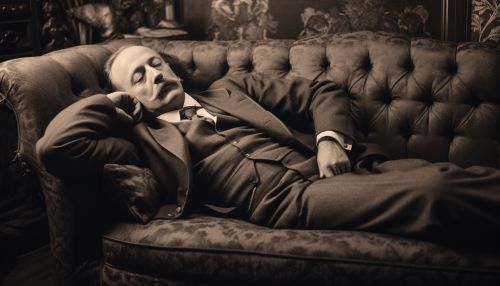Psychoanalytic theory of dreams
Introduction
Psychoanalytic theory of dreams, a significant concept in psychoanalysis, posits that dreams are a reflection of repressed desires and unconscious thoughts. This theory, primarily developed by Freud, has been a subject of extensive study and debate in the field of psychology and psychotherapy.


Historical Background
The psychoanalytic theory of dreams was first proposed by Sigmund Freud in his seminal work, The Interpretation of Dreams, published in 1899. Freud, often referred to as the father of psychoanalysis, suggested that dreams are a form of "wish fulfillment" - manifestations of unconscious desires, thoughts, and motivations.
Freud's Theory
Freud's psychoanalytic theory of dreams revolves around the idea of "wish fulfillment". He proposed that dreams are the unconscious mind's way of resolving repressed desires. Freud divided the structure of dreams into two parts: the manifest content and the latent content.
Manifest Content
The manifest content of a dream, according to Freud, is the actual storyline or events that occur in the dream as the dreamer remembers it. This content is often influenced by external stimuli or events from the dreamer's day.
Latent Content
The latent content, on the other hand, is the underlying, unconscious thoughts and desires that the dream represents. These are often repressed or forbidden thoughts and desires that are not expressed in waking life due to societal norms and moral constraints.
Carl Jung's Perspective
Jung, a student of Freud, had a different perspective on dreams. He agreed with Freud that dreams were a reflection of the unconscious mind, but he disagreed with the idea that they were solely a form of wish fulfillment. Instead, Jung proposed that dreams are a tool for the unconscious mind to communicate with the conscious mind, often revealing insights about the individual's psychological state and potential for personal growth.
Modern Perspectives
Modern psychoanalytic theories have expanded on Freud's and Jung's ideas, incorporating new findings from neuroscience and cognitive psychology. Some psychoanalysts, like Lacan, have emphasized the role of language and symbolism in dreams, while others have focused on the biological and neurological aspects of dreaming.
Critiques and Controversies
Despite its influence, the psychoanalytic theory of dreams has been subject to criticism. Some critics argue that the theory is unscientific and lacks empirical evidence. Others point out that the theory's emphasis on sexual and aggressive desires is overly simplistic and does not account for the complexity of human psychology.
Conclusion
The psychoanalytic theory of dreams has had a profound impact on our understanding of the human mind. Despite its controversies, it continues to be a subject of study and debate, offering valuable insights into the mysterious world of dreams and the unconscious mind.
